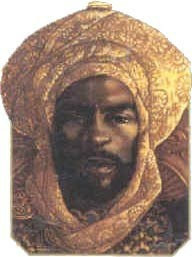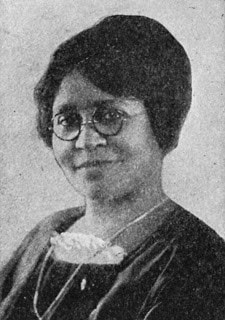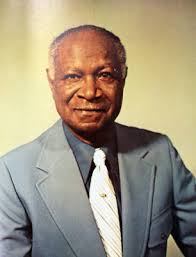|
Information is lost about the birth and early years of Sonni Ali, but we do know he was the man who is the founder of the Songhai Empire, which he ruled for 28 years. Before Songhai became a mighty empire it was a small kingdom under the control of the Mali Empire. Around the end of the 14th century Sonni Sulaiman Mar an ancestor of Sonni Ali was able to regain control of Songhai from the Mali Empire. In 1464, Sonni Ali Ber became the ruler of the Songhai Empire. Before he became the ruler Ali was well trained in political and military science. He understood the importance of retaining the empires capital city of Gao. As the 15th ruler of Songhai, one of his first acts was to defeat the Mossi and the Dogon to help expand his empire. His next victory was the conquest of the historic city of Timbuktu. The Mali Empire reached out to Ali for help against nomadic invaders called the Tuareg, after defeating the Tuareg he also captured the city of Timbuktu. At this point Ali held control of the cities of Gao and Timbuktu, now had his eyes set on the trading city of Jenne. With a Navy of over 400 ships Ali laid siege upon the city of Jenne for 7 years until he gained control of the city. Now Ali’s Sudanic Empire held control of the Niger River and its many natural resources, as well as control of the 3 main cities that were a part of the Trans-Saharan Trade routes. The Trans-Saharan Trade routes connected people and resources from the Mediterranean Sea to the Niger River. Ali controlled the Niger River area from Timbuktu to the Great Lakes region by the year 1476; he was also able to maintain peace among the collective Kingdoms and became a foremost producer of grain. As a military commander, Ali took advantage of the landscape and constructed a mighty Cavalry which was used to defeat the nomadic Taureg. He also used his Cavalry and Navy to defeat the mighty Mossi at the Watala region, and the Fulani of Dendi. 1492 was the year that Sonni Ali died; some stories state that he drowned returning home from a victory against the Fulani, other stories state that he was poisoned by one of his commanders Mohammad Ture. We do know that the story of Sonni Ali is told from two viewpoints; traditional Songhai oral tradition and Islamic historians. The Songhai tradition is said to praises him as a great and just ruler, the builder of the mighty Songhai Empire. The Islamic tradition is said to regard him as an oppressor and who disrespects traditional Islamic customs. Ali incorporated Islamic religion, customs and culture into the traditional African culture he was raised with. I see a man who was able to build an Empire that was able to thrive under his rule for 28 years. He took a small kingdom with only one major city and expanded his kingdom into an Empire history will never forget. Emperor Sonni Ali Ber, we proudly stand on your shoulders. J.A. Ward. References:
https://en.wikipedia.org/wiki/Sonni_Ali http://epicworldhistory.blogspot.com/2012/04/sunni-ali-founder-of-west-african.html http://africanhistory.about.com/od/kingdoms/a/Bio-Sonni-Ali.htm http://www.blackhistorypages.net/pages/sunnialiber.php
0 Comments
On August 9, 1869 Annie Minerva Turnbo was born in Metropolis, Minnesota to parents Robert and Isabella Turnbo. The tenth of eleven children of former slaves, she and her family lived on a farm until her parents died, she was then raised by an older sister in the nearby city of Peoria, Illinois. As a child Annie endured a lot of illnesses causing her to miss many days of school, as a result she did not complete high school. Despite her setbacks, Annie’s spirit was not broken; little did she know she was about to change the world one hair follicle at a time. She became interested in hair care while becoming the stylist for herself and he sisters. She learned that different people can have different textures of hair; particularly she became interested in the different textures of hair that African-American women possessed. She notices that African-American women at the time were interested in straightening their hair in a way that wouldn’t damage their hair. While living in Brooklyn, Illinois Annie used her knowledge of chemistry and natural herbs to create a straightening product for African-Americans that did not damage their hair and scalp. Before she created her product people used various harmful chemicals and animal fats to straighten their hair. Because of the success of her straightening solution, she was able to open a storefront in Brooklyn, Illinois and continue to build her brand. Her next move was to introduce her new product “The Great Wonderful Hair Grower,” she also developed and introduced the straightening comb to the haircare industry; something she is rarely credited for. Annie would move her business to St. Louis, Missouri in 1902 where she would begin hiring and training assistants to work with her. Because of their race Annie and her assistants did not have access to the traditional distributions systems of the day. That did not deter Ms. Annie, she began selling her products door to door providing demonstrations and educating her clients about her products. Because of her efforts Annie and her products found success and a legend was born. Her “Poro” hair styling method was in demand and becoming a thriving business. She named her products and her enterprise “Poro” after a West African devotional society dedicated to health and spiritual growth through discipline. She would copyright her Poro brand to protect her name as her products become more and more popular amongst African-Americans in St, Louis. Annie was very ambitious and confident in her products so she decided to sell her product nationally. She traveled throughout the south stopping at black churches and community centers holding demonstrations and gaining customers. She would also hold press conferences and take out ads in black newspapers to promote her Poro brand. A part of her strategy was to recruit and train Poro agents throughout the country to help promote her brand and grow her industry. A little known fact is that Madame C.J. Walker was one of Annie’s recruits who later became very successful in the haircare industry. It is said that Annie was upset at Walker for developing products very similar to hers after learning from her as an agent. Walker’s products led Annie to copyrighting her Poro brand and products. Madame C.J. Walker is often credited with being the pioneer of the black haircare industry and the creator of the pressing comb; but it was Annie Malone who first created the industry and the pressing comb, which gave Walker the knowledge and the platform to create her products. In 1914 Annie married Mr. Aaron Malone a school principle and ex bible salesman who would help her realize her dreams even further. The Malone’s dedicated themselves to empowering the people in their community, in 1918 they opened Poro College at place where African-American’s can gain an education and skills to build an industry for themselves. The college served as a meeting center for the black community, and it also provided a thorough education in the hair care and beauty industry. Both males and females were allowed to learn at the college which was valued to be worth over one million dollars. Annie was a very generous person; her success meant others would benefit from her blessings. Her college employed 175 people, her industry employed 75,000 women internationally; her net worth was valued at fourteen million dollars in the 1920’s. She was known for living a modest life and giving away large sums of her money. Annie was known for supporting the college fund for two students at every Historically Black College & University in the country. She donated $25,000 to Howard Medical School during the 1920’s and also donated money to Tuskegee Institute. She gave $25,000 to help build a YMCA for black children in St. Louis, Missouri; she would give her employees and family gifts of money and assets to help them buy land and build wealth. She raised money for the reconstruction of an orphanage for black children which was renamed the Annie Malone Home. Despite her generosity, Annie was a victim of financial ruin. The inexperience of her financial team led to a loss of money, assets and a legal fight to retain their Poro enterprise. During the turmoil Aaron Malone filed for divorce and demanded half of the business. Annie received support from her workers, customers, the press and Madame C.J. Walker which helped her to retain her business. Annie moved to Chicago in 1930 but continued to face financial troubles, lawsuits and tax problems. The Poro enterprise eventually folded and the legend of Annie Malone faded with her business. Annie died at the age of 87 in 1957 having lost the legacy that she built. Madame C.J. Walker would go on to become known as the pioneer to the black haircare industry and first African-American female millionaire. Truth be told, if it were not for Annie Malone the black haircare industry would not exist. Annie Malone used her god given abilities and the skills she acquired from her Aunt and her chemistry background to create a hair straightening product that would literally change her life. Poro College was a training ground for many successful African-Americans who were able to provide the world with their talents. Mrs. Annie Minerva Turnbo Malone, we proudly stand on your shoulders. J.A. Ward. Alonzo Smith “Jake” Gaither was born in Dayton, Tennessee in 1903 and was raised as the son of a outspoken preacher. As a young man Gaither was intrigued by the powerful speakers in his community, he learned that one could move men with the power of words. He was a member of the debate team and he was interested in studying law at while completing his studies at Knoxville College. He became a member of the football team at Knoxville College until around 1927, the year Gaither would also deal with the death of his father. Because of his father’s death Gaither stopped going to school and started working to support himself and his family. He would move to North Carolina to teach and coach at Henderson Institute until around 1935. His next job was coaching at St. Paul Junior College in Virginia until he became an assistant coach on the football staff at Florida A&M University in 1942. Jake Gaither moved to Tallahassee, FL and began coaching, three years later he would find himself as the head coach if the Florida A&M University Rattler football team. Little did he know he would become one of the most influential and most quoted coaches of all time. Gaither was also a person of great inner strength being a survivor of two malignant brain tumors during the early 1940’s. Coach Gaither built a reputation for recruiting good players and creating great men. He was very capable of finding the best talent in the south and dominating his competition. Because of segregation the best black plyers of the time had no choice but to play football at historically black colleges. Coach Gaither took advantage of the talent he had access to and created a legacy that rivals the greatest of any white university. “Poppa Gaither” is one of the many nicknames Gaither earned over the years, he was thought of a father figure for his players away from their homes. Gaither was able to recruit and mentor Hall of Fame talented players like Bob Hayes and Ken Riley who became ambassadors for Florida A&M University. Gaither was also a mentor for legendary football coach of Florida State University Bobby Bowden. Gaither’s influence was not going unnoticed within the football world, at one point between 85 to 95 percent of the black high school football coaches in the State of Florida were mentees of Coach Gaither. During Gaither’s first year as head coach of Florida A&M his team would win its conference championship and the following six conference championships. Gaither would become famous for his often used quote “I like my boys to be agile, mobile, and hostile.” A quote that is still used to this day, but I doubt many know the origins of the quote. During the 1950’s Gaither would hold coaching clinics at Florida A&M where we used coaches like Bear Bryant and Adolph Rupp to staff his clinic. He was also more than a great motivator he was a great strategist as well, he is credited for improving on the Wing T-formation offence by splitting the position of his offensive linemen making the office more difficult to stop. This improvement was so affective other schools black and white would integrate Coach Gaither’s Split Wing T-Formation within their offenses. In 1963 Coach Gaither and his assistant coaches would literally publish the book about the split-t offence titled The Split Line T Offense of Florida A&M. Gaither used the football field to help shape and mold the next generation of leaders in Black America, it is documented that he referred to the football field as his “laboratory for manhood.” In 1964 he would settle a dispute between Bob Hayes and some of this players; some of the other players was jealous of Hayes because of his Olympic success. Coach Gaither lined his players up and told them if they wanted as much attention as Hayes then they should outrun him. It is safe to say he had no more problems with the continuity of his players. In 1969 Gaither lead his rattler football team into a game which was the first game between black and white colleges in the south. Gaither and his split-t offense gained a victory over the University of Tampa. 1969 was the year that Coach Gaither retired from coaching football; he left the game with a record of 204-36-4 record, a winning percentage over 800, six All-American players, 42 rattlers to become professional football players, 22 conference championships and six Black College National Championships. Coach Gaiter has amassed many awards and accomplishments such as being inducted into the Tennessee and National Football Foundation Halls of Fame. All of the accomplishments Coach Gaither earned in his life, nothing was more satisfying to him than knowing he had a hand in creating men who could change the world. Coach Alonzo Smith “Jake” Gaither, we proudly stand on your shoulders. J.A. Ward |
Details
Categories
All
Click Here to join our mailing list
|
Contact Us: |
Connect With Us |
Site powered by PIT Web Design




 RSS Feed
RSS Feed



